#auerbücher
Text
We have a wild Johann Ludwig Wilhelm Gleim on pg. 75

He shows up to teenage-Ephraim's house, tells his sister her betrothed had been executed by his boss & that he's quit his job & gives a forehead kiss. I'm utterly feral
16 notes
·
View notes
Text
Berthold Auerbach Continues to be Wrong but Amusing

When one surveys the sublime friendships in the history of the German spirit, next to Luther and Melanchthon, Goethe and Schiller, the friendship of Lessing and Mendelssohn must also be named. It would be incorrect to portray them as congenial natures, but in active love of humanity, in love of pure truth they were of equal birth; the tempestuous man and the almost timidly considerate one cultivated true friendship through a whole generation; on the foundation of studying truth they held true to and supported on another.
Berthold Auerbach, "The Genesis of Nathan the Wise."
The more I read from Auerbach the more I conclude that his takes are not necessarily harmful but just...not accurate? He was also the one (according to Knobloch) to perpetuate the story of Mendelssohn & Fromet's engagement which is also probably not what happened.
Also absolutely wild to compare the collaborations of a) Luther & Melanchton, b) Goethe & Schiller & c) Lessing & Mendelssohn. Mister those are three v. different dynamics & exactly one of them should be called a friendship.
#berthold auerbach#gotthold ephraim lessing#moses mendelssohn#luther#menlanchthon#goethe#schiller#schoethe#of which sherb is aware but does not personally ship#auerbücher#übertrager übertreter
7 notes
·
View notes
Text
fascinated by the choice to have Ephraim teach his sister German via Lessing

to read a play whose hero represents a level of societal acceptance & virtue you want to attain, to read aloud with your sister speeches both awful & idealistic, if not yet as good as Lessing's latter works, to read Lessing at all
if he shows up it's gonna be like if I ever meet Tom Stoppard
#should I actually read this play or just take Knobloch's word about it#gotthold ephraim lessing#berthold auerbach#dichter und kaufmann#auerbücher#sherb's sub sub library
7 notes
·
View notes
Text

I haven't made enough progress to know whether it will impact the story but it's been mentioned twice in Dichter und Kaufmann that their house is right next to a fencing school.
Is this book made for me? Is it meant to entice me to read more of the Moses Mendelssohn fanfic?
Because it's working
#dichter und kaufmann#berthold auerbach#auerbücher#sherb's sub sub library#now and then stab as occasion serves
6 notes
·
View notes
Text

:)
5 notes
·
View notes
Text
I'm a Little Disappointed in Auerbach's Translator
So I'm reading Auerbach's Poet and Merchant in English translation because I like the formatting of that edition better, but on page 50 Ephraim's dad said something that confused me at first:

He goes on to say that the "Liberals" encourage Jews to turn away from their faith & assimilate to the customs of the majority society. That's a pretty consistent complaint across the centuries, so when I heard the word "Liberals" I worried Moses Daniel might have been referring to debates & reforms which would take place in Hamburg half a century after the setting of Dichter und Kaufmann, which would lead to the founding of Reform "liberal" Judaism.
Obviously that's anachronistic to the time of Mendelssohn and Kuh, but not to Auerbach's time, and there's some ideological similarities between the philosophers of the 18th century and the reformists of the 19th, so I went back to the German copy of Dichter und Kaufmann and found the same speech:

Auerbach's original refers to the "Aufgeklärten," that is, participants in the Enlightenment, many but not all of whom would have identified as "liberals" in the political or economic senses of the word. Maybe since the German word Liberal is associated with Reform Judaism, the translator of Dichter und Kaufmann wanted to indicate a continuity? I probably would have just said "the philosophers" or even "the philosophes," while the word "maskilim" might indicate that Ephraim's dad is raising an intracommunal concern but depending on the circumstances could be anachronistic.
In conclusion, translation is interesting and Sherb is dumb
5 notes
·
View notes
Text
My dear friends and mutuals I read the first chapter of Berthold Auerbach's book Poet and Merchant: a Picture of Life from the Times of Moses Mendelssohn and I am afraid that I am going to have to blog the whole book.
Originally published in 1839 as Dichter und Kaufman: ein Lebengemälde aus der Zeit Moses Mendelssohns, the book is available in English translation at HATHI Trust and in German on Google Books in its first and second volumes. I'll be reading the English edition, partly for ease of website access & partly because of lines like these:

Knobloch mentions the book in Herr Moses in Berlin, almost a century and a half later, in conjunction with the titular character Ephraim Moses Kuh. The book promises to be a fictionalised account of Kuh's life as he relocates from Breslau to the big city "in the time of Moses Mendelssohn & a portrayal of (Auerbach's conception of) Jewish life in German-speaking places during this period. It's one of several historical novels by Auerbach, who was a big fan of Spinoza and had previously made him the subject of a biography.
But while in life Auerbach seems to have been quite vocally opposed to Antisemitism—he came from a poor Jewish family himself before being seduced by Spinoza—the first chapter has not been promising in its attempts to portray the "local color" which characterizes the genre.
I'll be tagging posts about Dichter und Kaufmann as #Auerbücher. I anticipate that the book will potray (at least) some in-story Antisemitism & Weird attitudes towards women, and while I'd like to be surprised to the contrary I expect these are things that not everyone wants on their dashes. My fervent wish is that this experiment records a 19th-century authors Historical RPF & maybe provides some material for my eventual undergraduate thesis.
In the meantime, I'm gonna be real Not Normal about reaching back into the past and trying to hold hands. Please ignore and/or forgive me as you see fit.
–Sherb
5 notes
·
View notes
Text
There is no fully heterosexual explanation for Ch. 14.
Not just the showing up at an older man's door at night, flinging yourself against him, sobbing and asking for his friendship. The doomed attempts at marriage―doomed chiefly but not solely because is a teenage cousin―the despair that there is no understanding in the world but between you & your fellow men, the fervent desire to quit your small town. Even the motif of all the dead young men
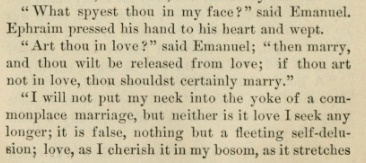

I know half of it is based on his lost love for Rosa but he's certainly projecting all of his Angst onto the desire to hold hands with a man.
On straighter notes, Veitel Ephraim is getting some character development
6 notes
·
View notes
Text
I was very scared for exactly two pages but on pg. 172 Auerbach's narrator steps in and digresses.
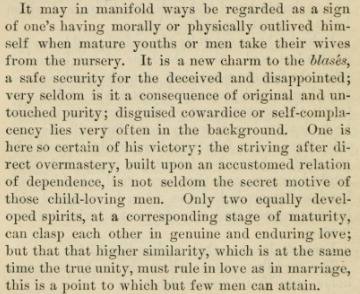
In context Ephraim has decided on a whim/taken a Sign to become engaged to his tweenage cousin, and Auerbach leavs an A/N to clarify that he does not condone this
3 notes
·
View notes
Text
I know this is an inauspicious start to my Dichter und Kaufmann-blogging but after being invited to Shabbes dinner & feeling obligated to contribute to the conversation a character has just told a very interesting anecdote, allegedly from the period of the Spanish Inquisition:
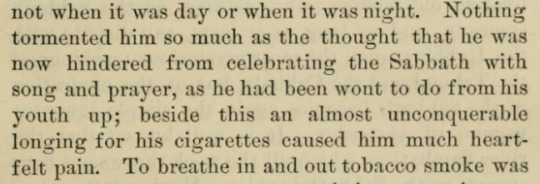
Thankfully the approach of the Sabbath relieves him of his longing for tobacco—but Tobacco? The American crop originally smoked communally before being cultivated on larger-scale plantations and exported to England in the early 16th century? Prior to the Alhambra Decree of 1492? In the form of cigarettes?
Every book which I've previously read has used the Spanish Inquisition as a reflection of their own anxieties, especially when those stories are placed within the accounts of another character. Not just the Grand Inquisitor Speech but also Heine's Almansor and a book by Jose Orabuena (b. Hans Sochachzewer) called Kindheit in Cordoba which I picked up a year ago from a cart in Kreuzberg and still have not read. For German-Jewish authors in particular, that setting could maybe represent anxieties about assimilation, conversion and acceptance, but I haven't read a wide enough sample size of stories to assert this confidently.
Within the text of Dichter und Kaufmann itself, it might make more sense to take the anecdote as a historically-inaccurate one with which the dinner guest is trying to impress his hosts. Or maybe it's a story Auerbach heard and wants to include because story-telling is a common interest of his characters. But even in the 1830s/40s, I don't know what a European-made cigarette would look like.
And if this impresses me, so does it too impress the host's son. And the story continues...
#Berthold Auerbach#Dichter und Kaufmann#comings and goings of men#sherb's sub sub library#auerbücher
3 notes
·
View notes
Text
Auerbach on The Genesis of Nathan the Wise:
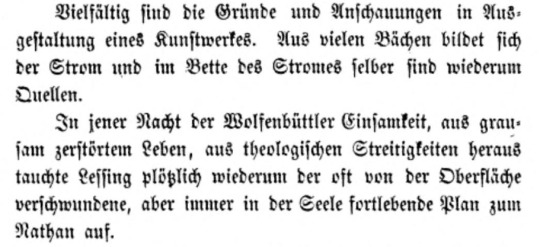
Diverse are the reasons and opinions in the formation of an artwork. The current forms of many streams and, in turn, sources are found on the bed of the stream itself.
On that night of Wolfenbüttler solitude, from a cruelly-destroyed life, out of theological disputes, Lessing in turn hauls up* the plan, often vanished from the surface but living ever on in the soul, for Nathan.
This is clearly what Stan Rogers was talking about when he wrote "The Mary Ellen Carter."
*auftauchen, to appear or to surface, usually appears in the context of something turning up or a book being published, but without an indication of somoene else bringing it to light.
#gotthold ephraim lessing#nathan der weise#nathan the wise#lessing#berthold auerbach#stan rogers#auerbücher#not being on boats
2 notes
·
View notes
Text
Got distracted looking through Auerbach's works and found an essay on the 100th anniversary of Nathan the Wise
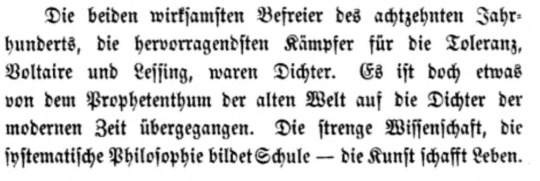
Both of the most effective liberators of the eighteenth century, the most prominent fighters for tolerance, Voltaire and Lessing, were poets. Yet something of the prophecy of the old world has passed over the poets of the modern time. Strict science & systematic philosophy produce schooling—Art creates life.
It's very funny to me that he puts Voltaire in the same category as Lessing. It's like putting them into a getalong shirt
#berthold auerbach#voltaire#gotthold ephraim lessing#lessing#Nathan the Wise#Nathan der Weise#auerbücher
2 notes
·
View notes
Text
The last two paragraphs of Dichter und Kaufmann are really neat
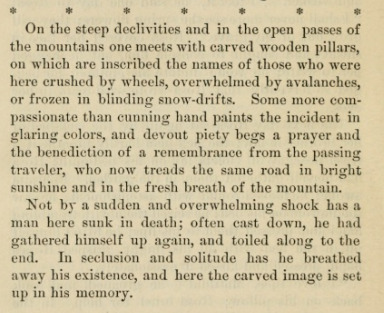
Auerbach's Ephraim Kuh lives long enough to hear about the storming of the Bastille, and dies holding out hope for future emancipation. The novelization of his life emphasizes how ordinary it was; only like 20% is the Berlin part with Mendelssohn & co but for all the tragedies that Ephraim endures he decides to keep going. For a character who relates so openly to Werther that's pretty impressive.
& the last paragraphs do a good job reflecting that: they're not awfully showy but they manage to make something beautiful out of a life that was lived under frequent injustice. I don't think Auerbach is a great reader but I certainly had a lot of fun posting about his 18th century fanfiction.
Anyway I got my hands on Auerbach's Spinoza (once again in English) and I think I'm going to keep up the Auerbücher tag with this one. I read the Ethics when I was 15 and while I'm not a theological spinozist I remember being very fond of his emotions theory (Joy is pleasure and knowledge of its cause!!!) and everyone in the 18th century is not a little obsessed with him so I will count this as research.
Thank you all for for reading and have a true & beautiful life unconquered by the woes of the world and the systematic cruelty of its inhabitants!
2 notes
·
View notes
Text
no, Ephraim.
You are 130% more interesting than Werther. You've, like, done stuff. And actually written poetry. And met Moses Mendelssohn.
Stop relating to literature Ephraim. You're letting the narrative doom you
2 notes
·
View notes
Text
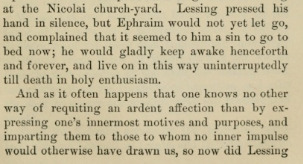
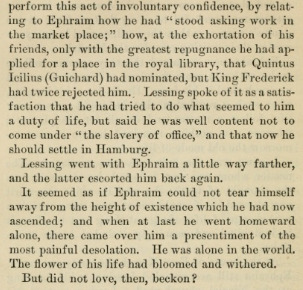
me after 1 seminar with my friends whom I love dearly
when you are afraid you are wasting your life & then they hold your hand <3
#gotthold ephraim lessing#beloved of the siblings kuh#berthold auerbach#dichter und kaufmann#auerbücher
2 notes
·
View notes
Text


Grown man GE Lessing pouting because his friends no longer want to hear him talk about his crush (Baruch Spinoza).
#ah to be a man chasing another man#philosophically of course#gotthold ephraim lessing#baruch spinoza#lessing#spinoza#berthold auerbach#dichter und kaufmann#auerbücher
3 notes
·
View notes